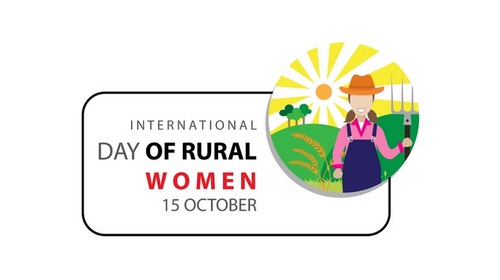
October 15 is the International Day of Rural Women, a day when women and girls living in rural areas are honoured for their essential role in global development. The theme for this year’s is ‘Rural Women, key for a world free from hunger and poverty.’
Rural girls and women are key agents of change and contribute a great deal to rural economies. In order for us to improve equity in rural communities, we need to empower and support rural girls and women to take up leadership roles.
There are over 1.7 billion girls and women living in rural communities across the world. These women are the glue that holds their communities together. In Sub-Saharan Africa, most women are responsible for feeding, raising and overseeing the wellbeing of their families. Rural women in Liberia are mobilising their communities and addressing food insecurity. During the peak of the pandemic, rural women in India became torch bearers of health education by becoming community health entrepreneurs.
Sofia is another example of what can happen when we support rural women. With a $200 grant obtained from the Supporting Women’s Livelihood Project in Zambia, she was able to turn her garden into a full-fledged business large enough to serve not just her family, but also her neighbourhood.
While with great effort rural women can make a difference, circumstances are generally stacked against them from the start. I was born in a rural community, but my parents moved us to the urban area when I was three. Even though I grew up in a poor urban community, there is still a huge gap in the opportunities available to girls in rural communities in comparison to those in poor urban areas.
I live in the same rural community where I was born, and I see hardworking girls and women go to their farms, markets, businesses daily to care for their homes. They have less access to resources and opportunities such as lands, healthcare, digital technology, investment options, education and many more systemic disadvantages just because of where they live. Rural women have the potential to lead and make a change if given the opportunity, yet their voices barely echo beyond their homes.
In a lot of ways, my life parallels theirs. Even though I have been privileged to break through many barriers to receive an education, work outside the home and hold leadership roles in and outside of Nigeria, I still find myself in rooms where my competency is questioned the moment people hear where I was born or live.
It’s not news that women across the world experience different barriers to taking up leadership roles, but these barriers are more amplified in rural women.
What can we do about this?
Firstly, there is a major lack of rural female representation in political leadership, public health sector, boards of companies and in managerial positions in Africa. We have relegated and defined experts as people with degrees and polished CVs. Whereas there are several women located in rural communities that are innovating in agriculture, businesses and many other sectors. Experts can be rural women too! Let’s redefine what we call experts.
Indeed, too often rural women are left out of conversations that impact their daily lives. We cannot keep bringing in people who pretend to understand what rural girls experience, to offer them thoughts on how to be leaders. When rural women are given a seat on the leadership table, they are better positioned to identify the challenges girls in their communities face and can proffer better solutions needed to improve their lives. Let’s bring in rural women as decision makers.
Secondly, we leaders in global development must use our networks to encourage the voices of rural women. Let’s stop holding global conferences on improving the lives of rural women, when the room is filled with people who do not understand their experiences. It is important for us to open doors for rural women to step up into these opportunities and take up the responsibility of shaping their communities. They may not have the network to do so but many in the global space can use their networks to link these women to speaking and leadership opportunities.
Thirdly, it’s not enough for us to empower rural women leaders and give them a seat at the table, we must create an enabling environment for their growth. Equipping rural women with the necessary leadership skills needed to amplify their voices on those tables is key. Vocation education schools and institutions can do this by tailoring fellowships and mentoring opportunities to be inclusive of rural women in order to deepen their knowledge in relevant fields and beyond.
There is a lot to learn from rural girls and women. We need more programmes that seek to promote their leadership and activism globally. We can also leverage on distance education to improve their leadership capacities.
In a world where young girls are still striving harder than boys when it comes to accessing education opportunities, it gets even harder for those in rural communities. This can be rectified only if education facilities identify places where rural women feel comfortable and train them in those spaces.
As we are bridging the gap in gender disparity, rural women must not be left behind. They know what equity should look like in their communities and are the expert voices we need to make a change. Let’s equip them to not only champion a healthier but a more inclusive transformation.
Dr. Adekemi Adeniyan is a rural dentist breaking down barriers to oral health for underserved communities to ensure equitable health access for all in Nigeria. She is Senior New Voices Fellow at the Aspen Institute and a Senior Atlantic Fellow for Health Equity at George Washington University. You can follow her on Twitter @PstDrKemi





